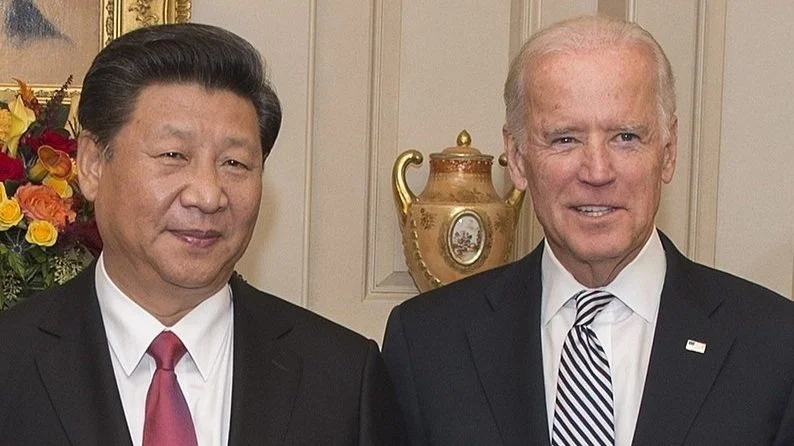Biden-Xi summit, GOP anti-China rhetoric underscore our love/hate relationship with the People’s Republic
Considering all the China-bashing that’s been going of late, the just concluded San Francisco summit between President Biden and China’s leader Xi Jinping (seen together in the public domain photo above, posted in wikimedia commons) illuminated our country's vacillating attitudes toward the People’s Republic of China (PRC). The exchanges of pleasantries and overall appearance of nice-making between the two leaders contrasted with frequent attacks against China — most notably from GOP presidential aspirants — and its growing political and media influence in the United States.
One day we’re all for the great business opportunities that our trade relationships with the PRC have created.
Next day our politicos are vilifying the Chinese for buying up American property and insidiously trying to influence our country using social media.
On that second score, the Republican hopefuls vying to replace Trump on the party’s ticket next year are trying to outdo each other with their anti-Chinese rhetoric, some of it centered on the potential damage to our national security that the social media app TikTok represents. Former New Jersey Gov. Chris Christie says “TikTok is not only spyware. It is polluting the minds of American young people all throughout this country.”
But it’s not just about TikTok.
Said Florida Gov. Ron DeSantis last August in a CNBC interview during which he called for regulatory and tax policies that would give domestic companies some leverage as they deal with Chinese competitors, “the United States has been the No. 1 source of Chinese wealth, and what have they done with that wealth? They’ve built up their military,” DeSantis said. “They are the top threat to this country.”
Said Nikki Haley to CNN last September, “China’s been practically preparing for war with us for years. Yes, I view China as an enemy.”
Meanwhile, here in South Dakota, Kristi Noem this year added her voice to the anti-China sentiment surfacing throughout the GOP by characterizing the PRC as one of seven “evil foreign governments” that will no longer be able to contract with state and local governments in South Dakota.
No question that these complaints have some basis to them, given China’s heinous human rights record and its support of some of the world’s most repressive regimes. Says Human Rights Watch in its 2023 report on China, “the Chinese government continues to provide direct assistance and military aid to several highly abusive governments, including the Taliban in Afghanistan and the military junta in Myanmar.”
China merits being treated as the pariah that these GOP tough-talkers make it out to be. When it comes to action, though, the reality is another story.
For one thing, looking at it locally, despite all of Gov. Noem’s anti-PRC rhetoric, we South Dakotans have to acknowledge that Chinese money is a big part of our economic infrastructure. Smithfield Foods, owned by the Chinese company WH Group, is a major economic presence in Sioux Falls. In 2020 (couldn’t find anything more current) it employed 3700 people and drew its hog supplies from 550 independent family farmers.
Noem and other China-bashers can carp all they want to, but they can’t and won’t lift a finger to expel an economic presence that is beholden to a Chinese government that Noem tagged as “evil.”
More broadly, South Dakota’s soybean farmers have much to appreciate when it comes to China. Overall, 2022 American ag exports to China set records, surpassing $36 billion. Soybeans accounted for about half of those sales. Corn had its second highest year in terms of dollar volume. This of course contrasts sharply to the weak sales of American ag products during the Trump administration, which followed up on its distaste for China by starting a “trade war” that nearly ruined our country’s ag sector. Turned out that thanks to Trump’s policies, America’s financially strapped farmers had to be propped up financially with nearly $30 billion of relief money (aka “mitigation payments”) from the U.S. Treasury.
What Trump showed us is that we can hate China as much as we like, but turning that hatred into policy can be an expensive proposition indeed.
Since then, the “we hate their ideology but we love their cheap products” approach is back in play. You can’t exactly call it a Joe Biden policy, but so far on his watch we’ve taken to buying so much from China that our historically large trade deficit with China has gotten even bigger of late.
That really shouldn’t come as a surprise, because with China, I doubt that our conflicting moral and economic imperatives will ever get into synch.
John Tsitrian is a businessman and writer from the Black Hills. He was a weekly columnist for the Rapid City Journal for 20 years. His articles and commentary have also appeared in The Los Angeles Times, The Denver Post and The Omaha World-Herald. Tsitrian served in the Marines for three years (1966-69), including a 13-month tour of duty as a radioman in Vietnam.







